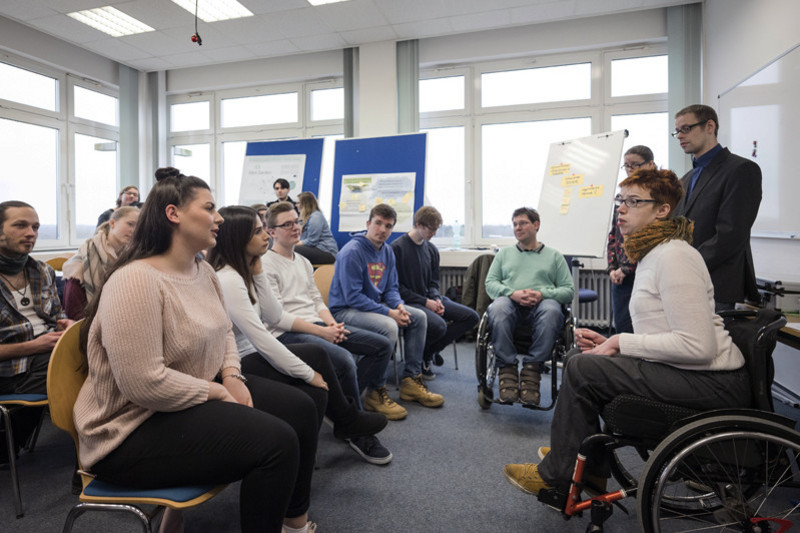Education at Eye Level: An Inclusive Project is Making Waves in the Classroom and Beyond

Six education specialists and one clear goal: to share experiences from their own learning biographies and to show that individuals with disabilities have plenty to offer on the general job market.
Since 2016, the Institute for Inclusive Education in Kiel has been training people with disabilities to become education specialists. In lectures, seminars and workshops, they share their knowledge and experiences with university students and managers, living out “education at eye level.” The project, which enables people with disabilities to share their expertise about their own field, thus generates important social impetus for direct interpersonal encounters and full societal participation. In the next five years, more than 60 additional educators will be qualified at 10 schools and universities nationwide - with the help of the Software AG Foundation. “At our current pace, we almost have to be careful that our desire to expand doesn’t catch up with us. A year ago, we said we wanted to be on ten campuses within five years; but this year we already have five locations”, said Dr. Jan Wulf-Schnabel, Director of the Institute, about the project’s impressive growth.
Sharing the life experiences of people with disabilities is at the heart of the project. In their lectures, Isabell Veronese and Laura Schwörer, two educators who have been in the program since day one, talk about their personal experiences. “What is exciting is not just that we can learn from each other, but also how authentic the teaching is. The fact that we can share from our own perspective, as affected individuals - that makes it exciting,” Schwörer says about the teaching situation. The two educators talk to future teachers and social workers about how they can approach students with disabilities, for example. Whether the disability is a learning disability or another barrier, visible or invisible, does not play a large role. When communication is impaired, when a student has listening difficulties, or when paying attention in the classroom is a challenge - the educators are able to offer help based on their own experiences. This help is especially useful for future teachers. “What is important is that a teacher always approaches the students at eye level and with heart,” Schwörer emphasizes.
It is exactly this insistence on interaction among equals and an authentic approach on the part of educators and Institute staff that is making the project a growing success. Training sessions for managers, administrative staff members, and government offices have become routine for the educators, as have lectures for students from different disciplines ranging from classical teacher training courses to future IT managers to business administration students.
Qualification as an educator in the program takes three years and includes an emphasis on the importance of education and participation as well as teaching skills, such as learning to how to present a lecture and acquiring instruments for practical knowledge transfer. It is an education that aims to provide both sides with more assurance and openness in everyday interactions.
For Isabell Veronese, external recognition is particularly important. She and her fellow teachers were motivated to join the program to gain a new sense of self-determination and for the new experiences it would bring. She also wants “to finally be able to use my head a little bit more. Before, I used to do a lot of monotonous things. Now I can’t imagine doing anything but this.” The most important requirements for participants are courage and interest in the project, said Sara Groß, the academic director at the Institute for Inclusive Education. “It’s important that the person is really interested in, and can really imagine, transferring from a workshop for people with disabilities into this kind of project - with the perspective of working in the general job market.”
Laura Schwörer and Horst-Alexander also took part in a predecessor project, “My World,” between 2009 and 2012. “When I heard that this “Inclusive Education” project was going to come to life, I immediately applied,” said Schwörer. Her colleague adds: “I said to myself: you can do more. And you have to change your professional environment. Then I took the bold step and I realized that work is satisfying. Work doesn’t define my life, but enriches it. I experience that every day, and for that I am very grateful.”
Growing interest makes clear: The Institute for Inclusive Education, with its goal of qualifying people with disabilities and clearing a path to the general job market, has created a successful model. In their work, Dr. Wulf-Schnabel and his team rely on international networking and awareness-raising. Their approach brings to life the principles set out in the UN Convention on the Rights of the Disabled. The six qualified educators are already giving lectures across Europe in places like Vienna, Birmingham, and Manchester, creating waves far beyond Kiel. The future of the project is envisioned by Dr. Jan Wulf-Schnabel in exactly in this way: “I can already imagine that, in ten years, we will be talking about a global approach. Or that it what I wish, in any case.”
